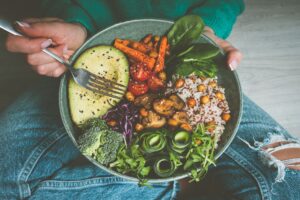
Vegetarianism, veganism, the Mediterranean diet, and the DASH diet, after all, are all plant-based.
Many people are turning towards plant-based diets to take advantage of potential health benefits. According to the U.S. National Library of Medicine, the plant-based foods market has risen 29 percent in recent years.
The switch from a meat-rich diet to one that centers on plants can be challenging.
So what is a plant-based diet?
It basically means that 80 to 90 percent of the foods you’re eating are plant-based. Ideally, they are unprocessed whole foods like fruits, vegetables, legumes, seeds, whole grains, and nuts.
But going plant-based doesn’t mean you have to give up animal-based foods entirely. Dairy like milk or yogurt, as well as nutrient-dense meats like fish, beef, and poultry, can be included on occasion to help round out nutritional needs.
You’ve probably heard various names for plant-based diets tossed around. There is vegan, which means zero animal products. It is typically grounded in ethical or environmental reasons. Vegetarians may have similar reasons but allow for some eggs or dairy of varying proportions.
But a Mediterranean style or DASH diet are plant-based as well, as are other diets that include eating meat rarely.
There is evidence that plant-based eating can reduce the risk for metabolic disorders, improve heart health, and help control type-2 diabetes and obesity.
Starting a plant-based diet can be a challenge, but thankfully, there are plenty of resources available to help you with ideas and recipes to bring variety and flavor to foods.
The key foods to a plant-based diet are:
- Leafy greens like spinach, turnips, green leaf lettuce, and kale
- Colorful veggies like bell peppers, carrots, corn, and potatoes
- Whole grains like brown rice, barley, wheat, and oats
- Fruits like apples, berries, oranges, etc.
- Unsaturated oils like olive oil
- A variety of plant-based proteins like beans, legumes, seeds, nuts, mushrooms
- Some dairy
- Limited amounts of protein from eat
Limiting processed plant-based foods is very important component of enjoying a plant-based diet. For example, French fries, chips, and even sugary candies are all plant-based but certainly not healthy.